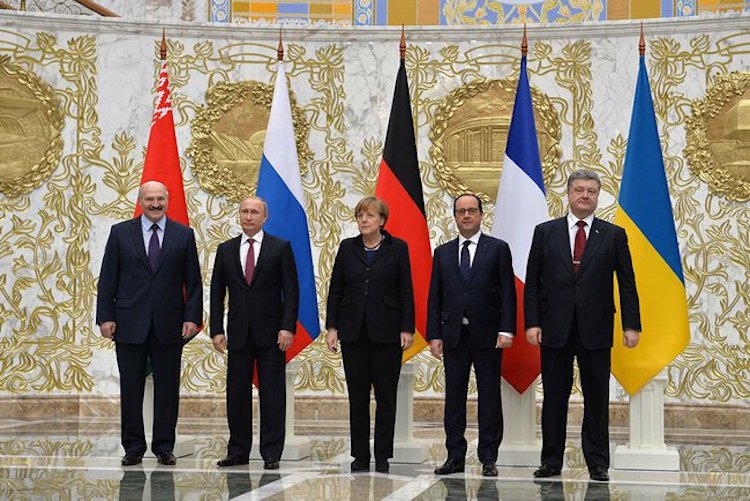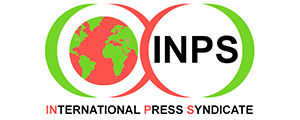
Viewpoint by Jonathan Power*
LUND, Sweden (IDN-INPS) – A few recent words from Jack Matlock who was U.S. ambassador to Moscow under presidents Reagan and Bush senior: “The Ukraine crisis is a product, in large part, of the policy of indefinite expansion of NATO to the east. If there had been no possibility of Ukraine ever becoming part of NATO, and therefore Sevastopol (the ex-Soviet naval port in Crimea) becoming a NATO base Russia would not have invaded Crimea.”
He goes on to say: “Americans have lived for nearly two centuries with the Monroe Doctrine [which forbids non-Americans to seize land or intervene in Latin America]. Why don’t we understand that other countries are sensitive about military bases from potential rivals not only coming up to their borders, but also taking land that historically they have considered theirs. These are extremely emotional issues – issues that are made to order for any authoritarian leader that wants to strengthen his rule”.
In a recent issue of Foreign Affairs, Alexander Lukin, vice-president of the Diplomatic Academy of the Russian Ministry of Foreign Affairs, adds a point: “It was only a matter of time before Russia finally reacted to Western encirclement.”
Matlock’s final point is that, “You have almost a clique in Washington that just can’t look at any atrocity in the world without wanting the U.S. to get involved militarily.” [Despite Iraq and Libya which are falling to pieces, perhaps to be followed by Afghanistan.]
Matlock was the top Soviet expert in the Reagan Administration before he became ambassador. His great predecessor in this role, George Kennan, went to his grave warning that an expansion of NATO would be totally counterproductive.
On July 25, by a vast majority, the U.S. Congress passed a motion ratcheting up the economic sanctions that have been imposed on Russia. President Donald Trump appears to have no choice but to sign this motion into law.
The biggest dividing issue between Russia and the U.S. and Europe is NATO expansion and Ukraine. As Matlock argues, they are linked.
NATO expansion is now a done deed. The imbroglio in Ukraine continues. Is there a way to repair the damage? Could Ukraine be turned into a buffer state which would abjure membership of NATO for all time? We still hear powerful voices in the West as well as in Ukraine calling for this. Could Ukraine have an economic arrangement with both the EU and the Russian-conceived Eurasian Economic Union?
I have every reason to believe, having just been to Moscow to talk to highly- placed political experts, that this could be the route to ending the fighting and solving the problem. All sides have to push to one side what Chancellor Angela Merkel calls “old thinking”.
The history of Siam and Switzerland after the Napoleonic wars and Finland and Austria after World War 2 suggests that a successful neutral state lying between two antagonists is possible. They might not have called themselves buffer states but in effect they were. Of course in Ukraine’s case the domestic policies have to bring stability and consensus at home or the outside big players will be tempted to intervene. Just repudiating NATO membership is not enough.
The Second Minsk Agreement negotiated in February 2015 by Merkel and presidents Vladimir Putin and Francois Hollande provides the framework for domestic accord. At the moment Russia and the Western nations seem to interpret the Agreement separately.
According to the World Policy Journal “the West tends to support reformers rather the reform process as such, and in that way implicates itself in internal political struggles that prevail within the entrenched, corrupt, political system.”
Besides that the West – in particular some high ranking people in NATO – sometimes speak as if it believes that Putin’s next step will be to send forces right into Ukraine. Putin is no fool and would not do that. Ukraine is not Crimea where Russia had a valid historical claim, even if Putin jumped the gun with the almost instant referendum.
It is true that Ukraine matters more to Russia than it does to Ukraine and so Russia is prepared to pay a higher price than the West. The status quo while certainly not welcome is liveable with. Russian can afford to wait until the West tires of its support of a government that doesn’t get on top of corruption or its economy and that is visibly influenced by far right groups which have their roots in Nazi organizations active during the time of World War 2.
Political authority has to be decentralised and demilitarized in Ukraine. Neutrality has to be its central policy. Eastern Ukraine can have some independence to pursue its own foreign policy in limited areas (not defence) just as Scotland and Catalonia do.
The final step would be to recognize that Ukraine is a buffer zone, neither of the East nor the West, but with peaceful and economically fruitful relations with both. [IDN-INPS – 01 August 2017]
*Note: For 17 years Jonathan Power authored “Like Water on Stone- the History of Amnesty International” (Penguin). He was a foreign affairs columnist for the International Herald Tribune. He has forwarded this and his previous Viewpoints for publication in IDN-INPS. Copyright: Jonathan Power.
Photo: At a summit in Minsk on 11 February 2015, the leaders of Belarus, Russia, Germany, France, and Ukraine agreed to a package of measures to alleviate the ongoing war in the Donbass region of Ukraine. The talks that led to the deal, overseen by the Organization for Security and Co-operation in Europe (OSCE), were organised in response to the collapse of the Minsk Protocol ceasefire in January–February 2015. Credit: Wikimedia Commons.
IDN is flagship agency of the International Press Syndicate.
facebook.com/IDN.GoingDeeper – twitter.com/InDepthNews

